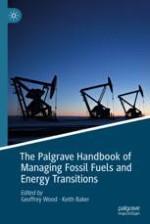2020 | OriginalPaper | Chapter
11. On the New Paradigm of International Energy Development: Risks and Challenges for Russia and the World on the Way to the Low-Carbon Future
Author : Andrey Konoplyanik
Published in: The Palgrave Handbook of Managing Fossil Fuels and Energy Transitions
Publisher: Springer International Publishing
Activate our intelligent search to find suitable subject content or patents.
Select sections of text to find matching patents with Artificial Intelligence. powered by
Select sections of text to find additional relevant content using AI-assisted search. powered by
